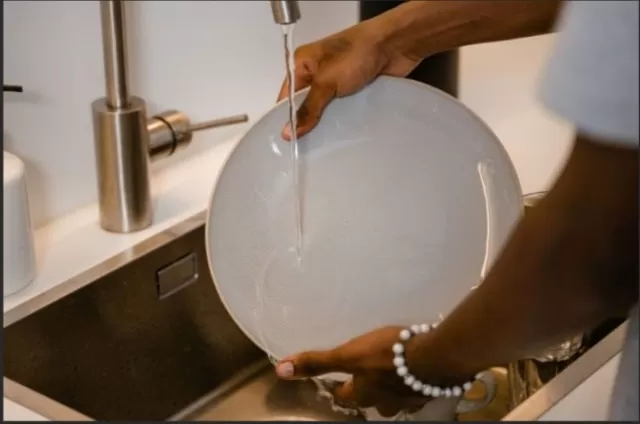12 Ingenious Dishwashing Hacks You Might Not Know (Part 2). Follow these handy Tips and Tricks to breeze through the ever-growing stack of Dirty Dishes in your sink, making the chore a more manageable and efficient task.
Skip the Pre-Rinse: Let Your Dishwasher Do the Work

Here’s a handy tip for a more efficient dishwasher routine: resist the urge to rinse your plates before loading them.
Instead, simply scrape off any leftover food particles. Surprisingly, those tiny food remnants left on your dishes can serve as a beneficial aggregate during the wash cycle.
They help enhance the cleaning process, ensuring your dishes come out sparkling clean without the need for a pre-rinse. So, save water and time by letting your dishwasher do what it does best – cleaning your dishes effectively.
Smart Dishwasher Loading: Flip-Flop Your Forks and Spoons
Optimize your dishwasher’s performance with a clever loading technique: alternate the position of your flatware.
When placing forks and spoons inside, mix it up by positioning some with their handles up and others with their handles down. This prevents forks and spoons from nesting together, ensuring they get thoroughly cleaned during the wash cycle.
However, remember to treat sharp knives with caution.
If you include knives in your dishwasher, always position them with their handles up for safety reasons. This way, you can enjoy the convenience of your dishwasher while keeping safety a top priority in your kitchen routine.
Streamline Your Dishwashing Routine: Presort Your Flatware

Here’s a handy tip to make your dishwasher loading and unloading process more efficient: sort your flatware as you load it.
Create separate bins or compartments for forks, spoons, and knives. Although this may seem like a small step, it can save you valuable time when it comes to putting away the clean dishes.
By presorting your utensils, you’ll not only simplify the unloading process but also ensure that each type of flatware gets a Thorough Cleaning during the dishwasher cycle, leaving your dishes sparkling and ready to use.
Efficiency in the Kitchen: Clean as You Cook
Here’s a time-saving kitchen tip: wash your pots and pans as you complete each cooking task.
Taking care of your cookware while it’s still warm offers multiple benefits. Not only does food residue come off much more effortlessly when the cookware is warm, but you’ll also have fewer items to clean once the meal is done. This approach not only keeps your kitchen organized and tidy but also makes post-meal cleanup a breeze. Plus, it gives you a head start on enjoying your meal without the looming chore of a sink full of dishes.
Efficient Dishwashing: Opt for Cold Water with Dairy and Starch

In the pursuit of a more efficient dishwashing routine, consider this counterintuitive tip: when cleaning dishes with dairy and starch residues, use cold water instead of hot.
This seemingly unconventional approach actually accelerates the cleaning process. Here’s why: hot water can make dairy and starch substances stickier and more stubborn to remove, while cold water helps prevent this issue.
Choosing cold water for your dishwashing endeavors can yield surprising benefits. Many people instinctively reach for hot water, believing it to be the most effective way to remove grease and grime from dishes. However, cold water can be a more efficient choice, especially when dealing with certain types of residues.
Coldwater is particularly advantageous when it comes to washing off sticky or greasy substances. It prevents the grease from melting and solidifying on your dishes, which can happen with hot water, making it more challenging to remove. In contrast, cold water keeps these residues in a more manageable state, allowing them to be easily rinsed away.
Moreover, using cold water can be environmentally friendly and cost-effective. Heating water consumes energy, and by opting for cold water, you reduce your overall energy consumption and, consequently, your utility bills. This small adjustment in your daily routine can contribute to a more sustainable lifestyle.
In addition to these practical benefits, cold water is gentler on your skin, which is especially important if you have sensitive hands. It minimizes the risk of scalding or drying out your skin, making dishwashing a more comfortable task.
In summary, making the switch to cold water for dishwashing can be a simple yet impactful change. It not only streamlines your cleaning process but also has positive environmental, financial, and ergonomic effects, ultimately making your daily chores faster, more efficient, and eco-friendly.
*The information is for reference only.